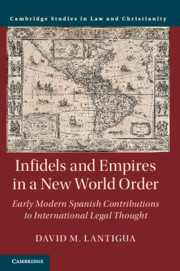 Infidels and Empires in a New World Order
Infidels and Empires in a New World Order Book contents
- Infidels and Empires in a New World Order
- Law and Christianity
- Infidels and Empires in a New World Order
- Copyright page
- Dedication
- Contents
- Figures
- Acknowledgments
- 1 Introduction: International Relations Beyond Westphalia
- Part I The New World Crucible of Infidel Rights
- Part II God, Empires, and International Society
- 5 From Infidels to Savages: Empires of Commerce and Natural Rights
- 6 The Scholastic Law of Nations, Native Occupation, and Human Solidarity
- Conclusion
- Bibliography
- Index
Conclusion
from Part II - God, Empires, and International Society
Published online by Cambridge University Press: 11 June 2020
- Infidels and Empires in a New World Order
- Law and Christianity
- Infidels and Empires in a New World Order
- Copyright page
- Dedication
- Contents
- Figures
- Acknowledgments
- 1 Introduction: International Relations Beyond Westphalia
- Part I The New World Crucible of Infidel Rights
- Part II God, Empires, and International Society
- 5 From Infidels to Savages: Empires of Commerce and Natural Rights
- 6 The Scholastic Law of Nations, Native Occupation, and Human Solidarity
- Conclusion
- Bibliography
- Index
Summary
Much of the conceptual and historical repository for international legal thought emerging out of seventeenth-century humanist lawyers and natural philosophers was gleaned from early modern Spanish sources based on the encounter with the New World. That initial contact, incursion, and subjugation of native peoples through Christopher Columbus, Hernán Cortés, Francisco Pizarro, and many other so-called travelers, along with their indigenous allies, would culminate legally and politically for the imperial conscience at the Valladolid junta. If Westphalia, even in a demythologized sense, represents a crucial ideological turning point for the dominant story of modern international relations, it is a story that cannot ignore the historical significance of Valladolid in the development of the idea and practice of world order.
- Type
- Chapter
- Information
- Infidels and Empires in a New World OrderEarly Modern Spanish Contributions to International Legal Thought, pp. 324 - 328Publisher: Cambridge University PressPrint publication year: 2020
